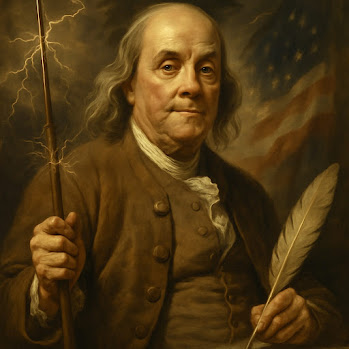Born into Shadows (1706)
It began in a small wooden house in Boston. A cold morning in January, 1706. Snowflakes whispered across cobblestone streets as Josiah Franklin welcomed his fifteenth child into the world.
Benjamin Franklin.
The name meant little then. Just another candle-maker’s son in a crowded, working-class family. They had no riches, no title. Just faith, labor, and flickering dreams.
Ben didn’t finish school. By age 10, he was pulled out to help make soap and candles. The boy who would one day electrify the world couldn’t afford a proper education.
But he had one secret weapon:
"A mind that refused to stay in darkness."
The Secret Writer of Boston:
At 12, Ben was apprenticed to his older brother James, a printer. Printing meant power words meant power and Ben devoured it all. Newspapers. Pamphlets. Books.
But James was cruel. He beat Ben, belittled him. So Franklin rebelled—in silence.
He invented a persona: Silence Do-good, a fictional widow with wit sharper than steel. Her satirical letters were published in The New-England Courant, Boston’s paper.
People adored him,
Fury.
Ben had broken rules, crossed lines—and become something dangerous:
A voice people listened to.
The Runaway Nobody (1723)
At 17, Franklin did the unthinkable: he ran away. A crime under colonial law.
He boarded a boat to Philadelphia ,tired, soaked, broke. He arrived with two loaves of bread, no connections, and zero reputation.
But something in him burned brighter than the city lights:
Ambition.
In Philadelphia, he started over. Clean slate. Dirty hands. Working in print shops, absorbing wisdom, mastering his craft. By 23, he owned a newspaper. By 26, he published Poor Richard’s Almanack, packed with proverbs still quoted today:
“An investment in knowledge pays the best interest.”
“Lost time is never found again.”
Ben wasn’t just working. He was building an American identity ,humble, clever, relentless.
The Lightning Tamer (1752)
Franklin’s mind never rested. He questioned everything, from how to warm a home more efficiently, to the mysteries of the skies. Electricity fascinated him.
A thunderstorm. A kite. A key. A man daring to understand (The wrath of the heavens). He proved lightning was electric. He (created the lightning rod) a simple device that saved thousands of homes and lives. Franklin could have patented it. He didn’t
“As we enjoy great advantages from the inventions of others,
we should be glad to serve others with any of ours.”
His goal wasn’t money. It was (progress).
The Reluctant Revolutionary
Ben wasn’t a born rebel. He loved England ,its science, its books, its culture. He spent (11 years in London) trying to mediate peace between the crown and the colonies.
Then came 1774,
He was dragged into a public British inquisition ,mocked, scorned, and publicly humiliated.
That day, the loyal subject died.
The patriot was born.
He returned to America. The Revolution was stirring. And Franklin ,a man of letters and lightning ,became a founding flame.
The Declaration and the Old Man Among Giants
1776. Philadelphia.
Franklin, Jefferson, Adams, and others gathered to write something the world had never seen: a declaration of independence.
Franklin was 70, suffering from gout, but sharp as fire.
“We must all hang together, or, most assuredly, we shall all hang separately.”
He signed it, knowing it could be his death warrant.
This was no longer politics. It was purpose .
The Kingmaker in Paris (1776–1785)
The Revolution was faltering. The Americans needed help.
So Franklin sailed to France. No wig. No pomp. Just fur hat, charm, and a razor-sharp mind.
The French adored him. He was witty, wise, and endlessly diplomatic.
Behind the scenes, he was pulling strings , persuading kings, securing funds and troops. He convinced France to join the war .A turning point that led to American victory.
The Constitution and the Final Wisdom (1787)
He was now 81. Sick. Carried into the Constitutional Convention in a sedan chair.
But his mind? Still lightning.
While others argued, Franklin united. When the final draft of the Constitution was ready, he looked at Washington’s chair.
On its back, a carved sun.
“I have... often looked at that behind the President without being able to tell whether it was rising or setting. But now.. I have the happiness to know that it is a rising, and not a setting sun.”
The Final Chapter (1790)
On April 17, 1790, Benjamin Franklin passed away in Philadelphia.
He was 84. Over 20,000 people attended his funeral.
Slaves he had once owned, and later helped liberate, mourned him. Foreign ambassadors sent condolences. Cities dimmed their lights.
He had been a candle maker’s son.
Now he was the soul of a nation.
His final words?
“A dying man can do nothing easy.”
But Franklin had made it look easy ,writing nations into being, trapping lightning, stitching wisdom into every thread of American life.
Legacy: The Spark Still Lives
Franklin’s name is etched on schools, towns, money, and minds. But his true legacy is less visible-and far more powerful.
It’s in every invention we share.
Every library we enter.
Every truth we dare to speak.
He was never just a man.
He was a movement.
From runaway to revolutionary. From candlelight to thunder.
Benjamin Franklin didn’t just live history.
He made it.
Final Thought
If you’ve ever started from nothing…
If you’ve ever been underestimated…
If you’ve ever dared to question what is…


